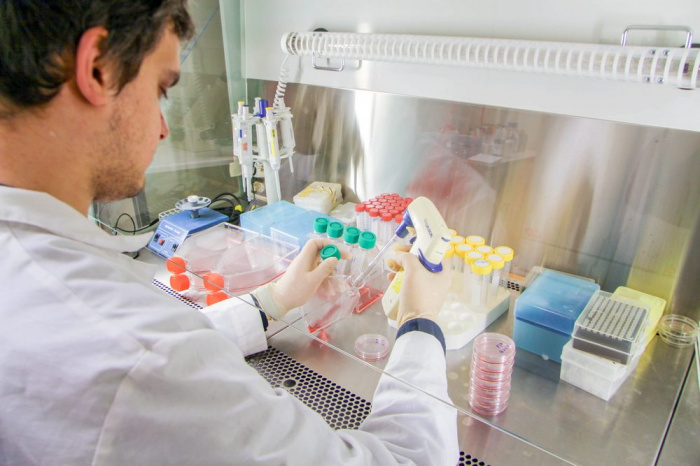
WCRC for Personalized Medicine conducts pilot preclinical studies of CAR-Т cells in animals
Drug development in the modern world involves a long process, including the mandatory stages of preclinical trials and production scaling, through a strict product quality control and compliance. All these stages take significantly more time, labour costs, intellectual investments and financial needs than the initial receipt of a laboratory prototype of a future drug. In their experimental studies of human diseases scientists use animal models that require appropriate animal management, ethics committee approval and detailed research protocols.
A promising area of translational medicine is the development of biomedical cell products, i.e. products obtained from modified human donor cells. Preclinical trials of such products involve a complex organizational and scientific process. Currently, CAR-T cell therapy is one of the most promising approaches in cancer treatment among biomedical cell products. For CAR-T cell therapy, T-cells are isolated from human blood, multiplied to a large number, genetically modified to recognize tumor cells by specific proteins on the surface (CAR), and then the resulting CAR-T cells are given to the patient by infusion. These "trained" cells can seek and destroy the tumor cells.
At the end of 2020, the scientists at Almazov Centre, as part of the WCRC for Personalized Medicine, conducted a pilot experiment to search for the mechanisms of tumor resistance to immunotherapy, and prepared models for further preclinical trials of CAR-T cells.
The study used a non-standard approach. Using molecular biology and genetic engineering methods, the scientists introduced a CD19 antigen (a target protein on the surface of some cancerous cells), synthesized in this way de novo, into the cells of a widely used model solid tumor. Then they monitored the growth and regression of the tumor, and also obtained additional data on the ability of CAR-T cells to infiltrate into tumor tissue. By various tests in laboratory animals, the specialists were able to assess the efficacy and toxicity of the obtained CAR-T cells and to determine the most effective route of administration, dosage (from 250 thousand to 5 million cells per individual) as well as the required duration of treatment (from 12 days up to 1 month).
The experiments showed a positive dynamics 12 days after the start of therapy, and the degree of the immune response was determined at the minimum dose of CAR-T cells. Even with huge tumors, animals injected with CAR-T cells tentatively “recovered”: after about a month, the tumor completely disappeared.
In addition to CAR-T cells targeting the B cell antigen CD19, the scientists are also studying the functions of CAR-T cells to the CD20 and NKG2D receptors, and the results will open the way for the treatment of a wide range of cancers and infectious diseases in the future.
The current work performed by the scientists of the WCRC for Personalized Medicine reveals the prospects and a high probability of success in carrying out further full-scale preclinical and clinical trials scheduled for 2021.
27.01.2021
